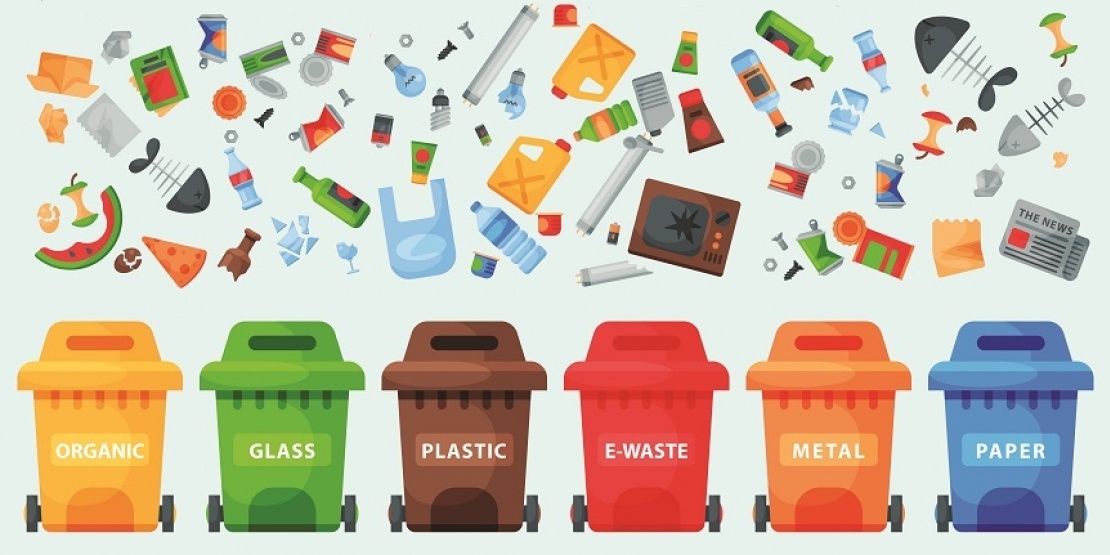Waste collection, treatment and recovery are a major environmental challenge. As such, regulations in this area are being strengthened, particularly with regard to companies. In order to adapt to the legislation of one of their host countries on waste management in companies, Capgemini decided to equip all the sites concerned with selective sorting points. Following the call for tenders, the Manutan Group, in association with Rossignol, one of its flagship suppliers of selective sorting solutions, was chosen to support the IT giant in this project.
Regulations on waste in companies
As the saying goes, "The best waste is that which isn’t produced". But when waste is produced, it is essential for it to be sorted so it can enter a recycling chain and thus be recovered. For a business, this involves installing waste handling equipment and a waste treatment system adapted to the different flows.
Directive 2008/98/EC of the European Parliament and of the Council of 19 November 2008 even establishes a waste hierarchy. It "generally lays down a priority order of what constitutes the best overall environmental option in waste legislation and policy". This order of priority is as follows: prevention, preparing for re-use, recycling, recovery (other than recycling) and finally disposal.
According to Article 1 of the 2008 Directive updated in 2018, the objective is to transform waste management "with a view to protecting, preserving and improving the quality of the environment, protecting human health, ensuring prudent, efficient and rational utilisation of natural resources, promoting the principles of the circular economy, enhancing the use of renewable energy, increasing energy efficiency, reducing the dependence of the Union on imported resources, providing new economic opportunities and contributing to long-term competitiveness".
This directive has been transposed into the legislation of the Member States of the European Union, leading to the introduction of obligations for companies throughout Europe.
Waste management in companies: the Capgemini example
"We recognise that we have a role to play in preserving natural resources and biodiversity while fighting pollution and climate change. We are committed to minimising our impact on the environment. That’s why this year we have implemented a waste policy at all of our sites. Our choice particularly focused on selective sorting at source in order to empower and involve our employees in this process," explains Claude Dalbera, then head of general services at one of Capgemini’s sites.
This new waste management policy aims to remove individual waste bins at workstations in shared spaces in order to install collection points for voluntary use. This entails changing the habits of employees, who must now physically move to dispose of their waste and make sure to sort it properly.
Organising waste management in companies
When it comes to sorting at source, the choice and installation of equipment require careful consideration. That’s why the company has opted for the creation of a tailor-made container to perfectly meet its needs. Driven by its partners’ advice, this metal container with a neat aesthetic has several advantages: it is easy to empty and has a lifetime three times longer than plastic products, no odour and excellent stability.
Once the model has been validated, each container is available in several versions, with colour, signage and opening adapted to each flow: paper, cups, metal and non-recyclable (also known as ordinary industrial waste).
In terms of organisation, the company defines two types of voluntary deposit points:
- A collection point for paper, cups and non-recyclable waste in each open space (covering 18 to 20 people and 150 to 200 m²)
- An additional collection point for non-recyclable waste, cups and metal in each living space such as cafeterias and dining spaces
Following an agile approach, the first tests led to two adjustments:
- The bins’ opening system was slightly adapted
- A collection point for cups and paper was added in each meeting room
Communication as a key success factor
For this type of project, internal communication is key. Employees must be supported in the process of change while being empowered.
The company is committed to a two-pronged action plan:
An information campaign:
- A clear display installed to familiarise employees with these new procedures
- A newsletter drawn up by Manutan and sent to all employees to inform them about selective sorting issues
A pedagogical approach:
- Training provided on selective sorting, accessible to all
- A fun questionnaire on waste management with prize giveaways for the winners
With the bins finalised, installation points defined and internal communication deployed, nearly 750 containers were then delivered to the other sites, representing no less than 250,000 m² of spaces to be equipped. Within a year, the 13 main sites involved in the project were equipped and employees were ready to welcome this brand-new waste handling policy into their daily lives.
The reduction, re-use and recycling of waste is now a major focus for the company as part of its responsible procurement policy. This is a lever that can be used to meet the new social and environmental requirements of our time.
About Capgemini
Capgemini is a global leader in consulting, IT services and digital transformation. At the forefront of innovation, the Group helps its customers seize all the opportunities presented by the cloud, digital solutions and platforms. With 50 years of experience and considerable expertise in various sectors, it supports companies and organisations in achieving their ambitions, from defining strategy to implementing operations. For Capgemini, it’s people that give technology its full value. Resolutely multicultural, the Group has 200,000 employees in more than 40 countries.
More information on www.capgemini.com. People matter, results count.









